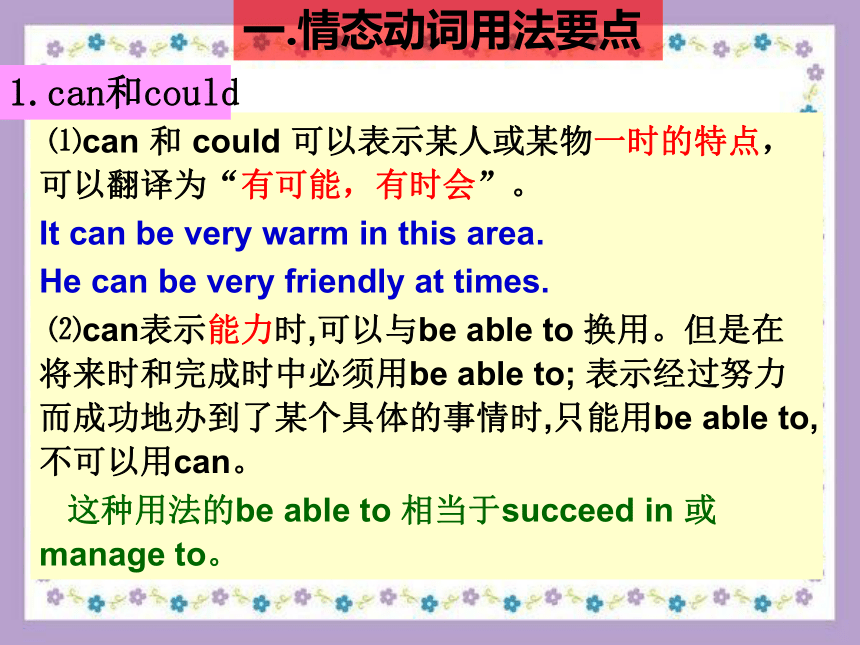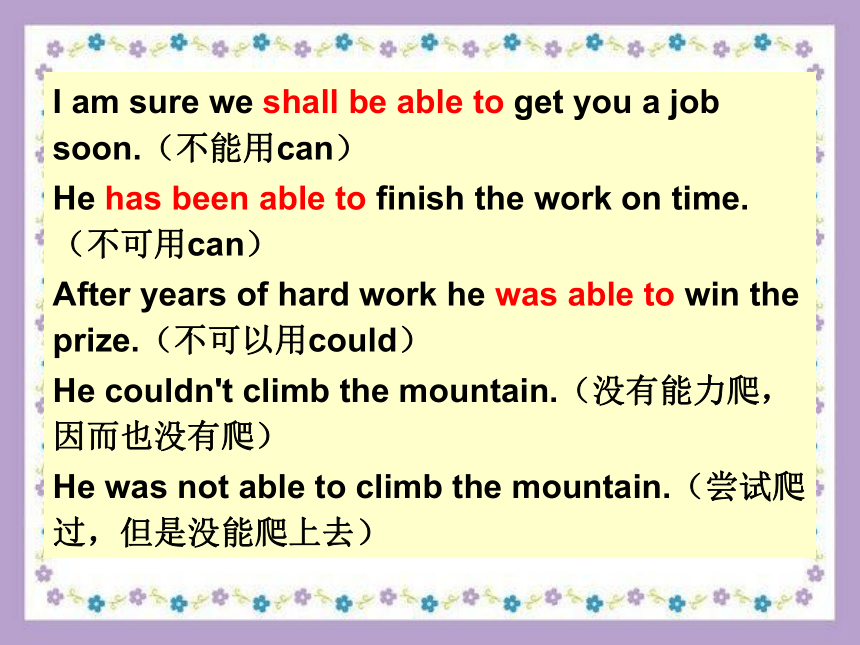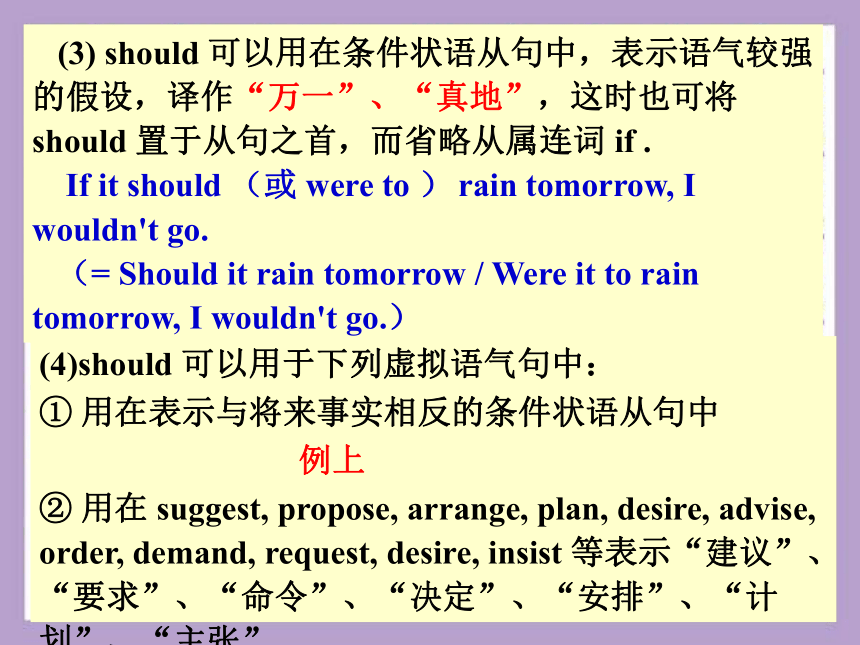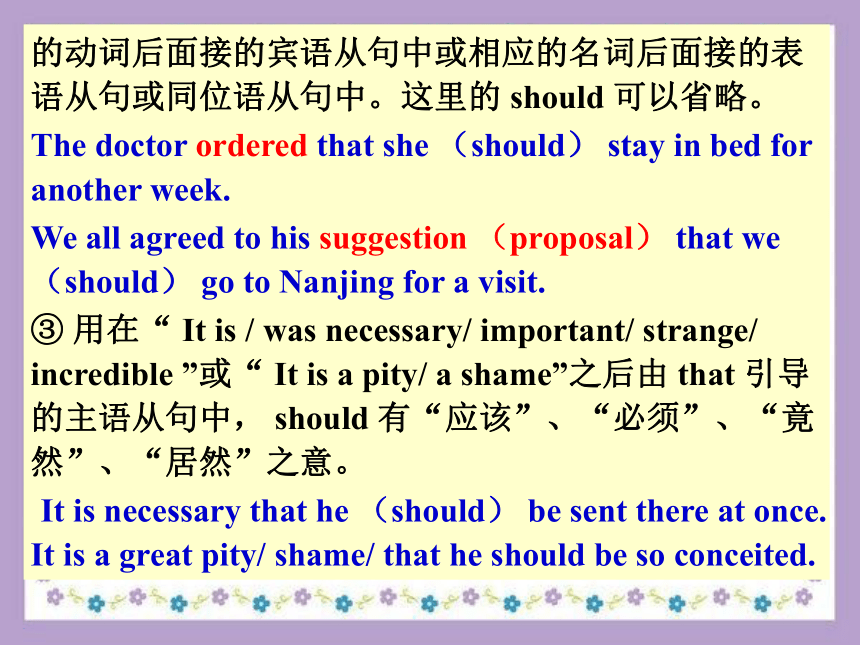情态动词和虚拟语气
图片预览












文档简介
课件36张PPT。情态动词用法详解一.情态动词用法要点 ⑴can 和 could 可以表示某人或某物一时的特点,可以翻译为“有可能,有时会”。
It can be very warm in this area.
He can be very friendly at times.
⑵can表示能力时,可以与be able to 换用。但是在将来时和完成时中必须用be able to; 表示经过努力而成功地办到了某个具体的事情时,只能用be able to, 不可以用can。
这种用法的be able to 相当于succeed in 或manage to。 1.can和couldI am sure we shall be able to get you a job soon.(不能用can)
He has been able to finish the work on time.(不可用can)
After years of hard work he was able to win the prize.(不可以用could)
He couldn't climb the mountain.(没有能力爬,因而也没有爬)
He was not able to climb the mountain.(尝试爬过,但是没能爬上去)shall可以用在第二、三人称,表示说话人的意图、允诺; 命令、威胁; 命运或必然结果等;在法律、条约、协定等文件中可以表示义务、规定等。
You shall have a lot of money.
Each citizen shall carry his identification card when travelling.
You shall arrive there before sunset.
If you don't behave yourself, you shall be punished.
Death is certain to all; all shall die.
Who touches pitch shall be defiled. 2.shall(允诺)(规定)(命令)(威胁)(命运)死必临万物;万物皆必死。(必然结果)⑴表示意愿或固执坚持。用于非人主语时,表示固有性质,倾向。
He is the man who will go his own way.
The window won't open.
The door won't shut.
⑵在含有if从句的主从复合句中,如果if引导的条件状语从句表示的是一般将来时或过去将来时,要用一般现在时或一般过去时来代替will或would 。
If you don't come here, I will go to find you .3.will但是will可以用在if从句中表示各种“愿望”,包括“请求,意愿,拒绝,同意,允许,能够,坚持,选择,计划”等。 If you will make another try, I shall do everything possible to help you. (意愿)
If he won't go with you, I shall ask somebody else. (拒绝)
If you will do it like that, you will fail.(坚持)(3)will可以表示一种习惯性的动作,有“总是”或“难免”,“会要”之意 。
Accidents will happen.事故难免会发生。
Boys will be boys.男孩子总是男孩子。(4)will可以用来表示某些根据自然规律必定会发生的事情,并且此时可以用一般现在时来代替它。
Oil will float on water. 在疑问句中,shall用于第一、三人称,表示说话人的征询对方意见或请求指示。 Shall I (he)…?
will用于第二人称, 表示说话人向对方提出请求或询问对方的意愿。 Will you…?
Shall I turn on the light? 要不要把灯打开?
Will you join us for dinner? 你可否和我们一道去吃晚饭? ⑴可以表示估计或推测上的 “应该”,还可以翻译成 “可能,该,估计,按理应当”等等。
They should be there by now, I think.
⑵表示惊讶,不以为然等情绪,用于某些句型中,多译为 “竟然”;经常用于疑问句和感叹句中表示意外,惊异等情绪,常和疑问词(why , how , whom,what)连用,而且疑问句不必回答。
It seems unfair that this should happen to me.
Why should I fear ?
Should you be so silly ? 4.should我会害怕?(=I don’t fear at all .)你会这么傻吗?(=You are not so silly .)(3) should 可以用在条件状语从句中,表示语气较强的假设,译作“万一”、“真地”,这时也可将 should 置于从句之首,而省略从属连词 if .
If it should (或 were to ) rain tomorrow, I wouldn't go.
(= Should it rain tomorrow / Were it to rain tomorrow, I wouldn't go.) (4)should 可以用于下列虚拟语气句中:
① 用在表示与将来事实相反的条件状语从句中
例上
② 用在 suggest, propose, arrange, plan, desire, advise, order, demand, request, desire, insist 等表示“建议”、“要求”、“命令”、“决定”、“安排”、“计划”、“主张”的动词后面接的宾语从句中或相应的名词后面接的表语从句或同位语从句中。这里的 should 可以省略。
The doctor ordered that she (should) stay in bed for another week.
We all agreed to his suggestion (proposal) that we (should) go to Nanjing for a visit.
③ 用在“ It is / was necessary/ important/ strange/ incredible ”或“ It is a pity/ a shame”之后由 that 引导的主语从句中, should 有“应该”、“必须”、“竟然”、“居然”之意。
It is necessary that he (should) be sent there at once. It is a great pity/ shame/ that he should be so conceited. (1)would作为will的过去式,可用于各人称,表示过去时间的“意志”或“决心”.
He promised he would never smoke again.
(2)在疑问句中,用于第二人称,表示向对方提出请求或许问对方的意愿时,比用will的语气更加婉转.
Would you like some more coffee?
(3)在日常生活中,学用“I would like to…”表示“我想要”或“我愿意”之意,以使语气婉转.
(4) 表料想或猜想
It would be about ten when he left home.
I thought he would have told you about it.5.would(5)would 和used to 的区别:
两者都可以表示过去的习惯性动作。但是would 只强调过去特定情况下的习惯性动作(由动态动词表示),单纯的过去和现在无关;
而used to 即可以强调过去的习惯性动作(由动态动词表示),也可以强调过去的事实或状态(由静态东此表示),且与现在形成对比。
She would sit there for hours sometimes, doing nothing at all .
I didn't use to like opera, but now I'm getting interested 。6.must的变脸(1)must的否定式是在must后面加上not,常缩写成mustn't,意思是“决不可;千万不能;务必不要”。You mustn’t tell her this news. 你绝不能…
在对May I ...?作否定回答时用No, you mustn't / can't。
(2)must的疑问式是将must提在主语前。must用在问句中作“必须”解,这时要注意肯定与否定回答时的用语。其肯定简略答语是Yes,主语+ must。若是否定回答,则是No,主语+needn’t或don‘t have to。
—Must I finish my homework today?
—No, you needn't. / Yes, you must. (3)must可以表推测,语气最强,只能用于肯定句,意为“准是;肯定”; 在否定句型中不用mustn‘t, 而用 can’t。
?The door is closed. He can't be at home. (4)对must 所在句子变反意疑问句时,
① “must be ”表示推测时,用be 的适当形式 。
You must be thirsty,aren’t you ?
②“must have done”表示推测时,一般用have 或 has, 但有明确表示过去的时间状语时,用过去时态。
He must have finished the work, hasn’t he ?
He must have gone abroad last week, didn’t he ?
You must have been told about it that day, weren’t you? 用作实义动词时,后接动词要用不定式,有人称和数的变化,可用肯定句、否定句和疑问句;
用作情态动词时,主要用于否定句和疑问句中,没有人称和数的变化,后接动词要用动词原形。如:
You need not pay—it is free.
We need to have lots of patience.
Who would dare to tell him?
He dared not go there at night.
How dare you ask me such a question?7. need和dare可用作实义动词和情态动词注:need 表示“需要”,其后可接动名词,且要用主动形式表示被动意义。如:
The room needs cleaning. may [might] as well可用来提出建议等,可译为“不妨,还是…的好”(用might时口气更委婉一些)。
Catherine, you may as well come too.
凯瑟琳,你不妨也去。
If that’s the case, I may as well try.
如果情况如此,我还是试一试。
(2) may [might] well可表示比较有把握的推测,意为“很可能”。如:
You might well be right. 你很可能是对的。8. may [might] as well和may [might] well的用法(1) must + have done用于肯定句, 意为“一定(已经)……”。
(2) can’t + have done用于否定句或疑问句, 意为“不可能(已经)……”。
(3) may + have done:用于肯定句或否定句,意为“可能(已经)……”。9. “情态动词+完成式”的用法1.用于推测(1)should (ought to) + have done,表示责备或遗憾等,意为“本来应该……”。
(2) needn’t + have done用于否定句或疑问句,意为“本来不必……”。2.用于虚拟语气(1) could + have done用于肯定句、否定句或疑问句,表示推测意为“可能……” 和虚拟语气(责备或遗憾)等, “本来可以……”。
(2) might + have done用于肯定句或否定句,表示推测,意为“可能(已经)……(此时 might 可换为 may);另外还可以表示虚拟语气,意为“本来会……”(此时 might 不能换为 may)。3.用于推测和虚拟语气1.Look what you have done. You ??? have been careful. ??A. should?? B. can?? C. must?? D. may
2. Tom is late. What ??????? to him? ?? A. should have happened B. must have happened ? C. can have happened? D. would have happened二、表示推测——情态动词的重要用法.肯定的推测
可能的推测
否定的推测
疑问的推测 must/should 对将来 对现在 对过去情态动词may, might can’t,
couldn’tcan, could + V. + V. + have done
常见must be + be doing + V. + V. + have done
+ be doing
可以用not表示“可能不”
+V. + V. + have done
+ be doing+ V. + V. + have done
+ be doing不同的“肯定”程度可按下列层次排列:
He is at home. (事实)
He must be at home.(非常肯定的推断)
He ought to be at home.(很可能)
He may be at home.(仅仅可能而已)
He might be at home.(或许, 非常不确定)
He might not be at home.(也许不在家)
He may not be at home. (比might可能)
He couldn’t be at home.(很可能不在家)
He can’t be at home.(一定不在家)
He isn't at home.(事实)might → may → could → can → should → ought to → would → will →must 不确定性 → 确定性---“When can I come for the photos? I need them tomorrow afternoon.”
---“They _________ be ready by 12:00.”
A. can B. should C. might D. need
在四个选项中,首先可排除A和D,因为它们通常不用肯定句中;而B和C均可用于肯定句表示推测,但根据句意:顾客下午要照片,此时店主显然应用语气较肯定的should,而不宜用语气很不肯定的might,否则顾客是不会满意的。(一)非真实条件句中的虚拟语气
(二)宾语从句中的虚拟语气
(三)主语从句中的虚拟语气
(四)表语从句、同位语从句中的虚拟语气
(五)状语从句中的虚拟语气
(六)几种特殊的虚拟语气三、虚拟语气时态从 句主 句表示现在过去时
(be---were)should+动词原形
would +动词原形
could +动词原形
might +动词原形
(一)非真实条件句中的虚拟语气1.和现在的事实相反
时态从 句主 句表示过去 had +
过去分词should+have+过去分词
would +have+过去分词
could +have+过去分词
might +have+过去分词
2.和过去的事实相反时态从 句主 句表示将来 should+动词原形
would +动词原形
could +动词原形
might +动词原形
3.和将来的事实相反1)were to
+动词原形
2)should
+动词原形
3)动词过去式(二)宾语从句中的虚拟语气1.wish后面宾语从句中的虚拟语气,表示与事实相反的愿望。
1)与现在事实相反 : wish + (that)+did(were)
I wish I were as healthy as you.
I wish that I had a plane.
2)与过去事实相反 : wish + (that)+had done
I wish I had been to the concert last night.
I wish you had written to him.
3)与将来事实相反 : wish +would/could/might+do
I wish he would forgive me.
2. 在某些动词后的宾语从句中需用should+动词原形的虚拟语气形式。“should”可以省略。
常见的动词有:一个坚持insist; 两个命令order, command ; 三条建议suggest , advise, propose;
四项要求demand, request, require, ask
注意: suggest表 暗示表明 时, insist表坚持认为时不用虚拟语气(三)主语从句中的虚拟语气基本句型:
1. It +be+过去分词+that…+(should)+动词原形+…过去分词:suggested, requested, ordered, proposed…It is required that nobody (should) smoke here.2. It +be+形容词+that…+(should)+动词原形+…It is necessary that we (should ) have a walk now.3. It +be+名词( a pity/a shame/ no wonder) that…
+ (should)+动词原形+…形容词: important, necessary, natural, right, wrong, better, funny, strange, surprising… (四)表语从句、同位语从句中的虚拟语气在 suggestion, proposal, idea, plan, order, advice, decision等名词后面的表语从句、同位语从句中要用虚拟语气,即(should)+动词原形。My suggestion is that we (should) leave at once.1)表语从句:2)同位语从句:I make a proposal that we (should) hold a meeting next week.(五) 状语从句中的虚拟语气1、用在由as if, as though引导的状语从句中,
表示和现在事实相反或对现在的怀疑,用过去时;
表示过去想象中的动作或情况,用过去完成时;
表示将来用would + 动词原形。
It seems as if the man were his brother.
This device operated as though it had been repaired.
2.用在lest, for fear that和in case引导的状语从句中,这时谓语动词用(should)+动词原形。
She closed the windows lest she catch cold.(六)几种特殊的虚拟语气1、虚拟倒装句
1.Were it (=If it were) not for their help, we couldn’t have got over the difficulties.
2.Had I (=If I had) known about it, I would have told you.
3.Should anyone (=If anyone should )call, please take
a message.2. 介词短语表条件
But for your help, we couldn’t have succeeded.
Nothing could live without the sun.3. 情境中提供虚拟语气
Suppose there were no gravity, objects would not fall to the ground when dropped.
She wasn’t feeling very well. Otherwise she wouldn’t have left the meeting so early.4. 比较if only与only if
only if 表示“只有”;
I wake up only if the alarm clock rings.
if only 则表示“如果……就好了”。其从句中的谓语
动词用过去时或过去完成时。
If only I knew more.
If only the alarm clock had rung. 5. It’s (high/low) time 从句:
It is (high) time that 后面的从句谓语动词要用过去式或用should加动词原形,但should不可省略。 It is time that the children went to bed. It is high time that the children should go to bed.
类似的结构为 would rather 从句:
I would rather you attended the meeting this afternoon.
1. It is time that you _________ the whole book.
A. must go over B. can go over
C. went over D. have gone over2.There is someone knocking at the door. _____ it be Tom? ? A. Can? B. Must? C. Should? D. Ought
3. ---"May I pick a flower in the garden?"
---" ??????? ." ??A. No, you needn't?? B. Not, please ??
C. No, you mustn't?? D. No, you won't
4.---"Could I call you by your first name?"
--- "Yes, you ??????? ." ??A. will?? B. could?? C. may?? D. might考题点击5.Whenever Mother was not here, the children ??????? make a lot of noise. A. will?? B. would??
C. were to?? D. were going to
6. The light in his room is still on, so he____ to bed. A. mustn’t have gone B. must have gone C. shouldn’t have gone D. can’t have gone
7. If only grandmother ____ this together with us now.
A. will see B. could see
C. must see D. should see8.What would have happened, _____ as far as the river bank? (01 上海)
A. Bob had walked farther
B. if Bob should walk farther
C. had Bob walked farther
D. if Bob walked farther
9. Without your help, we ____ such rapid progress.
A. couldn’t make B. wouldn’t make
C. will not have made D. wouldn’t have made
10.I went by plane; otherwise I ____ much longer time.
A. could take B. would take
C. will have taken D. would have taken
It can be very warm in this area.
He can be very friendly at times.
⑵can表示能力时,可以与be able to 换用。但是在将来时和完成时中必须用be able to; 表示经过努力而成功地办到了某个具体的事情时,只能用be able to, 不可以用can。
这种用法的be able to 相当于succeed in 或manage to。 1.can和couldI am sure we shall be able to get you a job soon.(不能用can)
He has been able to finish the work on time.(不可用can)
After years of hard work he was able to win the prize.(不可以用could)
He couldn't climb the mountain.(没有能力爬,因而也没有爬)
He was not able to climb the mountain.(尝试爬过,但是没能爬上去)shall可以用在第二、三人称,表示说话人的意图、允诺; 命令、威胁; 命运或必然结果等;在法律、条约、协定等文件中可以表示义务、规定等。
You shall have a lot of money.
Each citizen shall carry his identification card when travelling.
You shall arrive there before sunset.
If you don't behave yourself, you shall be punished.
Death is certain to all; all shall die.
Who touches pitch shall be defiled. 2.shall(允诺)(规定)(命令)(威胁)(命运)死必临万物;万物皆必死。(必然结果)⑴表示意愿或固执坚持。用于非人主语时,表示固有性质,倾向。
He is the man who will go his own way.
The window won't open.
The door won't shut.
⑵在含有if从句的主从复合句中,如果if引导的条件状语从句表示的是一般将来时或过去将来时,要用一般现在时或一般过去时来代替will或would 。
If you don't come here, I will go to find you .3.will但是will可以用在if从句中表示各种“愿望”,包括“请求,意愿,拒绝,同意,允许,能够,坚持,选择,计划”等。 If you will make another try, I shall do everything possible to help you. (意愿)
If he won't go with you, I shall ask somebody else. (拒绝)
If you will do it like that, you will fail.(坚持)(3)will可以表示一种习惯性的动作,有“总是”或“难免”,“会要”之意 。
Accidents will happen.事故难免会发生。
Boys will be boys.男孩子总是男孩子。(4)will可以用来表示某些根据自然规律必定会发生的事情,并且此时可以用一般现在时来代替它。
Oil will float on water. 在疑问句中,shall用于第一、三人称,表示说话人的征询对方意见或请求指示。 Shall I (he)…?
will用于第二人称, 表示说话人向对方提出请求或询问对方的意愿。 Will you…?
Shall I turn on the light? 要不要把灯打开?
Will you join us for dinner? 你可否和我们一道去吃晚饭? ⑴可以表示估计或推测上的 “应该”,还可以翻译成 “可能,该,估计,按理应当”等等。
They should be there by now, I think.
⑵表示惊讶,不以为然等情绪,用于某些句型中,多译为 “竟然”;经常用于疑问句和感叹句中表示意外,惊异等情绪,常和疑问词(why , how , whom,what)连用,而且疑问句不必回答。
It seems unfair that this should happen to me.
Why should I fear ?
Should you be so silly ? 4.should我会害怕?(=I don’t fear at all .)你会这么傻吗?(=You are not so silly .)(3) should 可以用在条件状语从句中,表示语气较强的假设,译作“万一”、“真地”,这时也可将 should 置于从句之首,而省略从属连词 if .
If it should (或 were to ) rain tomorrow, I wouldn't go.
(= Should it rain tomorrow / Were it to rain tomorrow, I wouldn't go.) (4)should 可以用于下列虚拟语气句中:
① 用在表示与将来事实相反的条件状语从句中
例上
② 用在 suggest, propose, arrange, plan, desire, advise, order, demand, request, desire, insist 等表示“建议”、“要求”、“命令”、“决定”、“安排”、“计划”、“主张”的动词后面接的宾语从句中或相应的名词后面接的表语从句或同位语从句中。这里的 should 可以省略。
The doctor ordered that she (should) stay in bed for another week.
We all agreed to his suggestion (proposal) that we (should) go to Nanjing for a visit.
③ 用在“ It is / was necessary/ important/ strange/ incredible ”或“ It is a pity/ a shame”之后由 that 引导的主语从句中, should 有“应该”、“必须”、“竟然”、“居然”之意。
It is necessary that he (should) be sent there at once. It is a great pity/ shame/ that he should be so conceited. (1)would作为will的过去式,可用于各人称,表示过去时间的“意志”或“决心”.
He promised he would never smoke again.
(2)在疑问句中,用于第二人称,表示向对方提出请求或许问对方的意愿时,比用will的语气更加婉转.
Would you like some more coffee?
(3)在日常生活中,学用“I would like to…”表示“我想要”或“我愿意”之意,以使语气婉转.
(4) 表料想或猜想
It would be about ten when he left home.
I thought he would have told you about it.5.would(5)would 和used to 的区别:
两者都可以表示过去的习惯性动作。但是would 只强调过去特定情况下的习惯性动作(由动态动词表示),单纯的过去和现在无关;
而used to 即可以强调过去的习惯性动作(由动态动词表示),也可以强调过去的事实或状态(由静态东此表示),且与现在形成对比。
She would sit there for hours sometimes, doing nothing at all .
I didn't use to like opera, but now I'm getting interested 。6.must的变脸(1)must的否定式是在must后面加上not,常缩写成mustn't,意思是“决不可;千万不能;务必不要”。You mustn’t tell her this news. 你绝不能…
在对May I ...?作否定回答时用No, you mustn't / can't。
(2)must的疑问式是将must提在主语前。must用在问句中作“必须”解,这时要注意肯定与否定回答时的用语。其肯定简略答语是Yes,主语+ must。若是否定回答,则是No,主语+needn’t或don‘t have to。
—Must I finish my homework today?
—No, you needn't. / Yes, you must. (3)must可以表推测,语气最强,只能用于肯定句,意为“准是;肯定”; 在否定句型中不用mustn‘t, 而用 can’t。
?The door is closed. He can't be at home. (4)对must 所在句子变反意疑问句时,
① “must be ”表示推测时,用be 的适当形式 。
You must be thirsty,aren’t you ?
②“must have done”表示推测时,一般用have 或 has, 但有明确表示过去的时间状语时,用过去时态。
He must have finished the work, hasn’t he ?
He must have gone abroad last week, didn’t he ?
You must have been told about it that day, weren’t you? 用作实义动词时,后接动词要用不定式,有人称和数的变化,可用肯定句、否定句和疑问句;
用作情态动词时,主要用于否定句和疑问句中,没有人称和数的变化,后接动词要用动词原形。如:
You need not pay—it is free.
We need to have lots of patience.
Who would dare to tell him?
He dared not go there at night.
How dare you ask me such a question?7. need和dare可用作实义动词和情态动词注:need 表示“需要”,其后可接动名词,且要用主动形式表示被动意义。如:
The room needs cleaning. may [might] as well可用来提出建议等,可译为“不妨,还是…的好”(用might时口气更委婉一些)。
Catherine, you may as well come too.
凯瑟琳,你不妨也去。
If that’s the case, I may as well try.
如果情况如此,我还是试一试。
(2) may [might] well可表示比较有把握的推测,意为“很可能”。如:
You might well be right. 你很可能是对的。8. may [might] as well和may [might] well的用法(1) must + have done用于肯定句, 意为“一定(已经)……”。
(2) can’t + have done用于否定句或疑问句, 意为“不可能(已经)……”。
(3) may + have done:用于肯定句或否定句,意为“可能(已经)……”。9. “情态动词+完成式”的用法1.用于推测(1)should (ought to) + have done,表示责备或遗憾等,意为“本来应该……”。
(2) needn’t + have done用于否定句或疑问句,意为“本来不必……”。2.用于虚拟语气(1) could + have done用于肯定句、否定句或疑问句,表示推测意为“可能……” 和虚拟语气(责备或遗憾)等, “本来可以……”。
(2) might + have done用于肯定句或否定句,表示推测,意为“可能(已经)……(此时 might 可换为 may);另外还可以表示虚拟语气,意为“本来会……”(此时 might 不能换为 may)。3.用于推测和虚拟语气1.Look what you have done. You ??? have been careful. ??A. should?? B. can?? C. must?? D. may
2. Tom is late. What ??????? to him? ?? A. should have happened B. must have happened ? C. can have happened? D. would have happened二、表示推测——情态动词的重要用法.肯定的推测
可能的推测
否定的推测
疑问的推测 must/should 对将来 对现在 对过去情态动词may, might can’t,
couldn’tcan, could + V. + V. + have done
常见must be + be doing + V. + V. + have done
+ be doing
可以用not表示“可能不”
+V. + V. + have done
+ be doing+ V. + V. + have done
+ be doing不同的“肯定”程度可按下列层次排列:
He is at home. (事实)
He must be at home.(非常肯定的推断)
He ought to be at home.(很可能)
He may be at home.(仅仅可能而已)
He might be at home.(或许, 非常不确定)
He might not be at home.(也许不在家)
He may not be at home. (比might可能)
He couldn’t be at home.(很可能不在家)
He can’t be at home.(一定不在家)
He isn't at home.(事实)might → may → could → can → should → ought to → would → will →must 不确定性 → 确定性---“When can I come for the photos? I need them tomorrow afternoon.”
---“They _________ be ready by 12:00.”
A. can B. should C. might D. need
在四个选项中,首先可排除A和D,因为它们通常不用肯定句中;而B和C均可用于肯定句表示推测,但根据句意:顾客下午要照片,此时店主显然应用语气较肯定的should,而不宜用语气很不肯定的might,否则顾客是不会满意的。(一)非真实条件句中的虚拟语气
(二)宾语从句中的虚拟语气
(三)主语从句中的虚拟语气
(四)表语从句、同位语从句中的虚拟语气
(五)状语从句中的虚拟语气
(六)几种特殊的虚拟语气三、虚拟语气时态从 句主 句表示现在过去时
(be---were)should+动词原形
would +动词原形
could +动词原形
might +动词原形
(一)非真实条件句中的虚拟语气1.和现在的事实相反
时态从 句主 句表示过去 had +
过去分词should+have+过去分词
would +have+过去分词
could +have+过去分词
might +have+过去分词
2.和过去的事实相反时态从 句主 句表示将来 should+动词原形
would +动词原形
could +动词原形
might +动词原形
3.和将来的事实相反1)were to
+动词原形
2)should
+动词原形
3)动词过去式(二)宾语从句中的虚拟语气1.wish后面宾语从句中的虚拟语气,表示与事实相反的愿望。
1)与现在事实相反 : wish + (that)+did(were)
I wish I were as healthy as you.
I wish that I had a plane.
2)与过去事实相反 : wish + (that)+had done
I wish I had been to the concert last night.
I wish you had written to him.
3)与将来事实相反 : wish +would/could/might+do
I wish he would forgive me.
2. 在某些动词后的宾语从句中需用should+动词原形的虚拟语气形式。“should”可以省略。
常见的动词有:一个坚持insist; 两个命令order, command ; 三条建议suggest , advise, propose;
四项要求demand, request, require, ask
注意: suggest表 暗示表明 时, insist表坚持认为时不用虚拟语气(三)主语从句中的虚拟语气基本句型:
1. It +be+过去分词+that…+(should)+动词原形+…过去分词:suggested, requested, ordered, proposed…It is required that nobody (should) smoke here.2. It +be+形容词+that…+(should)+动词原形+…It is necessary that we (should ) have a walk now.3. It +be+名词( a pity/a shame/ no wonder) that…
+ (should)+动词原形+…形容词: important, necessary, natural, right, wrong, better, funny, strange, surprising… (四)表语从句、同位语从句中的虚拟语气在 suggestion, proposal, idea, plan, order, advice, decision等名词后面的表语从句、同位语从句中要用虚拟语气,即(should)+动词原形。My suggestion is that we (should) leave at once.1)表语从句:2)同位语从句:I make a proposal that we (should) hold a meeting next week.(五) 状语从句中的虚拟语气1、用在由as if, as though引导的状语从句中,
表示和现在事实相反或对现在的怀疑,用过去时;
表示过去想象中的动作或情况,用过去完成时;
表示将来用would + 动词原形。
It seems as if the man were his brother.
This device operated as though it had been repaired.
2.用在lest, for fear that和in case引导的状语从句中,这时谓语动词用(should)+动词原形。
She closed the windows lest she catch cold.(六)几种特殊的虚拟语气1、虚拟倒装句
1.Were it (=If it were) not for their help, we couldn’t have got over the difficulties.
2.Had I (=If I had) known about it, I would have told you.
3.Should anyone (=If anyone should )call, please take
a message.2. 介词短语表条件
But for your help, we couldn’t have succeeded.
Nothing could live without the sun.3. 情境中提供虚拟语气
Suppose there were no gravity, objects would not fall to the ground when dropped.
She wasn’t feeling very well. Otherwise she wouldn’t have left the meeting so early.4. 比较if only与only if
only if 表示“只有”;
I wake up only if the alarm clock rings.
if only 则表示“如果……就好了”。其从句中的谓语
动词用过去时或过去完成时。
If only I knew more.
If only the alarm clock had rung. 5. It’s (high/low) time 从句:
It is (high) time that 后面的从句谓语动词要用过去式或用should加动词原形,但should不可省略。 It is time that the children went to bed. It is high time that the children should go to bed.
类似的结构为 would rather 从句:
I would rather you attended the meeting this afternoon.
1. It is time that you _________ the whole book.
A. must go over B. can go over
C. went over D. have gone over2.There is someone knocking at the door. _____ it be Tom? ? A. Can? B. Must? C. Should? D. Ought
3. ---"May I pick a flower in the garden?"
---" ??????? ." ??A. No, you needn't?? B. Not, please ??
C. No, you mustn't?? D. No, you won't
4.---"Could I call you by your first name?"
--- "Yes, you ??????? ." ??A. will?? B. could?? C. may?? D. might考题点击5.Whenever Mother was not here, the children ??????? make a lot of noise. A. will?? B. would??
C. were to?? D. were going to
6. The light in his room is still on, so he____ to bed. A. mustn’t have gone B. must have gone C. shouldn’t have gone D. can’t have gone
7. If only grandmother ____ this together with us now.
A. will see B. could see
C. must see D. should see8.What would have happened, _____ as far as the river bank? (01 上海)
A. Bob had walked farther
B. if Bob should walk farther
C. had Bob walked farther
D. if Bob walked farther
9. Without your help, we ____ such rapid progress.
A. couldn’t make B. wouldn’t make
C. will not have made D. wouldn’t have made
10.I went by plane; otherwise I ____ much longer time.
A. could take B. would take
C. will have taken D. would have taken
